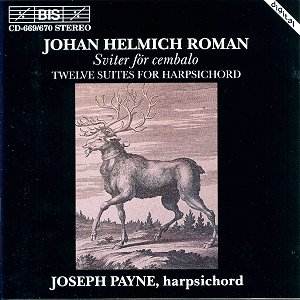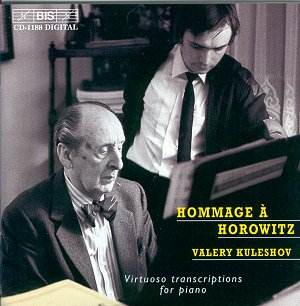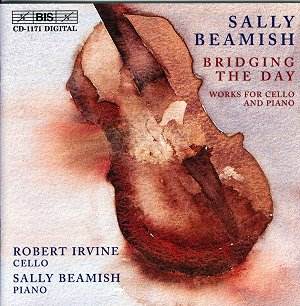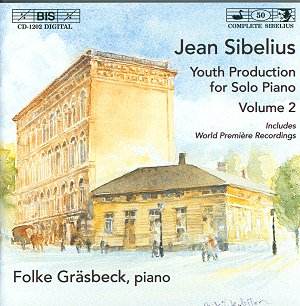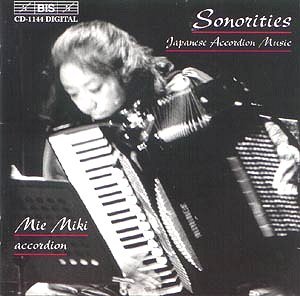 Album Review: Sonorities
Album Review: Sonorities
Works: Mie Miki (accordion)
Label: BIS CD-1144 [DDD]
Duration: 79:03
Release Date: October 2001
Performers: Mie Miki (accordion), Toshio Hosokawa, Hikaru Hayashi, Maki Ishii, Yuji Takahashi, Meiro Sugawara, Ayuo
In the ever-evolving landscape of contemporary classical music, the accordion has often been relegated to the periphery, overshadowed by more traditionally lauded instruments. However, Mie Miki’s stunning rendition in Sonorities, featuring a compelling selection of Japanese compositions, invites listeners to reconsider the accordion’s expressive potential. The recording, made at Länna Church in Sweden in May 2000, showcases both Miki’s virtuosic command of the instrument and the rich tapestry of modern Japanese soundscapes.
The disc opens with Toshio Hosokawa’s Melodia II, originally composed for piano and reimagined for accordion with the composer’s approval. This nine-minute piece is a mesmerizing exploration of timbre and texture. From the outset, Miki’s performance is notable for its ethereal quality; she extracts a clarinet-like sound from the accordion, which sets a meditative tone. The pentatonic scale employed by Hosokawa evokes a sense of calm and introspection, reflecting the title’s reference to the “never-ending stream of sounds in our soul.” Miki’s ability to navigate the contrasting registral extremes—delicate high notes juxtaposed with a profound lower register—serves to heighten the piece’s emotional gravitas.
In contrast, Hikaru Hayashi’s A Bee Crosses Over the Strait does not quite achieve the same level of engagement. While the title suggests a vivid narrative potential, the piece ultimately succumbs to a pace that feels languid and uninviting. The lack of dynamic variation and thematic development leads to a somewhat forgettable experience, a stark juxtaposition to the compelling nature of the preceding work.
Much more invigorating are the contributions from Maki Ishii. His Lost Sounds II, Op. 33b employs pre-recorded tape sounds that create an atmospheric backdrop over which the accordion weaves its narrative. Miki’s expressive phrasing and nuanced dynamics provide an excellent commentary on the tape’s glacial textures, demonstrating her ability to blend the live and the recorded seamlessly. Tango-Prism, Op. 73, composed in 1987, is a delightful reinterpretation of the tango, presenting the familiar dance form through a lens of distortion and complexity. Miki’s rhythmic acuity and her flair for dramatic contrasts effectively mirror the piece’s intent, inviting listeners to reconsider preconceived notions of both the tango and the accordion.
Yuji Takahashi’s Like a Water-Buffalo is particularly noteworthy, both for its poetic preamble and its evocative sound world. Miki’s reading of the accompanying poem in Japanese adds a layer of authenticity and cultural depth, allowing the listener to appreciate the interplay of text and texture. The accordion’s voice becomes an extension of the poetry, imbuing the performance with a richness that transcends mere musical notes.
Meiro Sugawara’s Capriccio Pastorale is a charming homage to Frescobaldi, where Miki’s light touch and lyrical phrasing evoke pastoral scenes with grace. Following this, Ruscello, initially intended as an encore to Sugawara’s Accordion Concerto, showcases Miki’s dexterity and command of the instrument, culminating in a performance that is both playful and technically impressive.
The excerpts from Ayuo’s Eurasian Tango serve as an energizing conclusion to the disc. Here, the accordion’s versatility is on full display, as Miki navigates intricate rhythms with ease, encapsulating the spirit of the tango while also offering a modern reinterpretation.
From a recording quality perspective, BIS has once again delivered a production that allows the subtleties of Miki’s playing to shine. The acoustics of Länna Church provide an ambient yet clear backdrop, allowing each tonal nuance to be captured effectively. The engineering choices enhance the listening experience, ensuring that the listener is enveloped in the sound without losing the definition of each note.
In summary, Sonorities serves as both a tribute to the versatility of the accordion and a celebration of contemporary Japanese composition. While not every piece achieves the same level of impact, Mie Miki’s consummate artistry and interpretative depth make a compelling case for the accordion’s place within the concert repertoire. This recording stands as a significant contribution to the understanding and appreciation of a relatively underrepresented genre, inviting listeners to engage with the accordion anew. As Miki embarks on this journey through uncharted waters, we are reminded of the instrument’s capacity for emotional expression and transformative storytelling.
